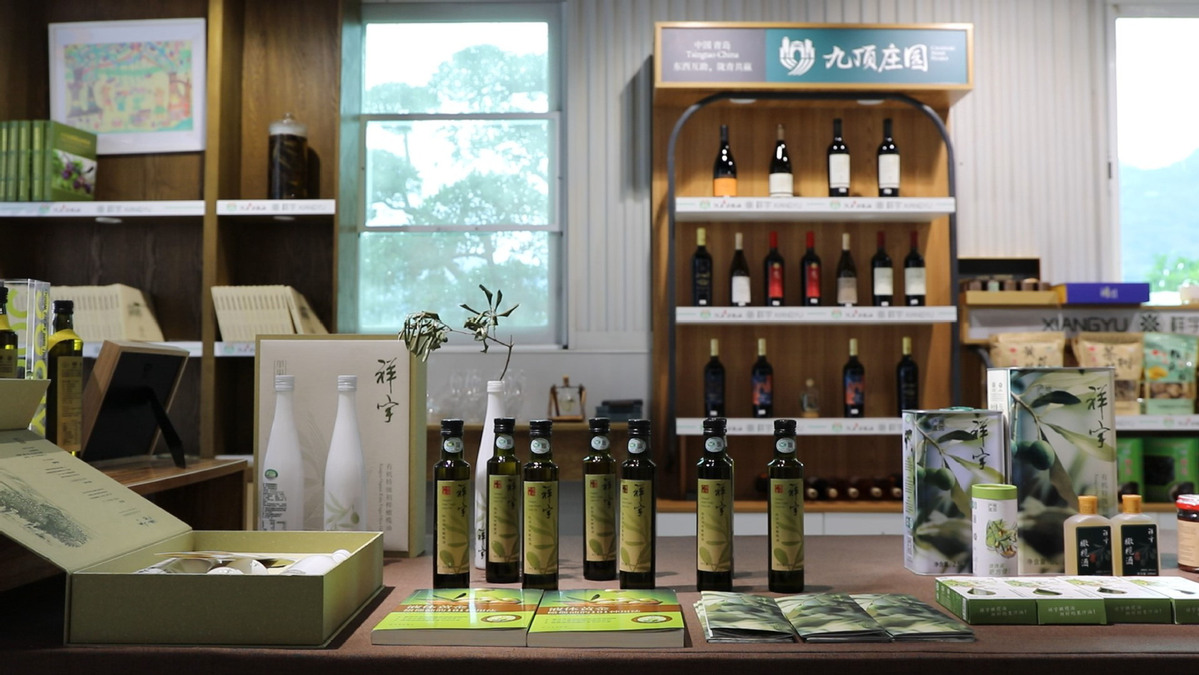Village's 'liquid gold' garners international acclaim


LANZHOU-When an international olive oil competition announced its winners in Greece last month, excitement rippled across the village of Daoqi in northwestern China. "The award-winning olive oil was made from our fruit," said Ru Ciming, a 50-year-old olive planter from the village located in the city of Longnan, Gansu province.
The variety of olive trees in Ru's orchard was introduced from Spain. In the eyes of locals, the foreign trees have not only pulled the city, once among the least-developed areas in China, out of poverty, but have also brought them international renown.
Olives originated in the Mediterranean, and their oil, often called "liquid gold", is used widely in food, cosmetics and medicine. In the 1960s, the Albanian government gifted China more than 10,000 olive saplings, which were then planted in many parts of the country on a trial basis. Longnan began to plant olive trees in the early 1970s, and experts concluded that the area was ideal for olive trees due to its climate and soil condition. After years of experiments and promotion, it is now the largest olive cultivation base in China.
In recent years, the local olive oil industry has continued to expand as Longnan has enhanced cooperation with Mediterranean countries that boast a long history of olive planting, including Italy, Greece and Spain. The enhanced cooperation aims to introduce better varieties and initiate technical exchanges.
Pedro J. Rodriguez Sanchez, a Spanish olive seedling expert, was one of the early contributors to recent olive exchanges. He arrived in Longnan in 2009, when only half the local olive tree seedlings had survived. His technical guidance helped raise the survival rate to over 90 percent.
Zhao Haiyun, an official in charge of promoting the olive industry in Longnan's Wudu district, said that many more European experts have arrived since Sanchez. They have visited orchards to offer guidance to farmers and have helped companies improve their processing and storage procedures.
They have also helped the district, as well as the city, jump on the bandwagon as demand for high-quality olive oil in China increases, especially among well-off urban families, Zhao said.
This year, Longnan's olive cultivation area grew to 42,000 hectares. Over 40,000 households have profited from the olive sector, which has become a local pillar industry. "Every drop of olive oil we produce is an example of the exchange and integration between China and other nations," said Li Gang, general manager of Gansu Times Olive Technology, a major olive oil producer in Longnan.
In 2019, the company spent more than 6 million yuan ($927,336) in introducing two advanced olive oil production lines from Italy. Li said the lines have improved processing efficiency and the quality of olive oil and helped the company win the prize at the olive oil competition in Greece.
That was not the first time domestic olive oil had won recognition on the international stage. A product created by the Longnan Xiangyu Olive Development Company earned that honor in July last year when it competed with 430 samples from 17 countries to nab the top Double Gold award at the Athena International Olive Oil Competition in Greece.
Olive oil exchanges in Longnan have continued to prosper despite the COVID-19 pandemic. In March, Fernando Lugris, Uruguayan ambassador to China, visited several Longnan olive oil companies to deepen cooperation in terms of variety introductions and technology exchanges.
Many local olive oil companies are also working with European countries on the biological utilization of olive oil. Longnan Garden City Olive Technology Development has said it is cooperating with the National and Kapodistrian University of Athens to extract compounds from the oil to increase the industry's added value.
Though olive trees are an imported species, their resettlement in China has not simply copied their successful development in their homeland. In China, the trees have followed a path of foreign cooperation and localization, said Jiang Chengying, a researcher with the Gansu Research Academy of Forestry Science and Technology.
"The olive trees have been a bridge of exchange and cooperation between the East and the West while contributing to China's cause of reducing poverty in its western regions," Jiang said.
Xinhua
- China's CR450: A new era of high-speed rail at 400 km/h
- TAN SUO SAN HAO to pioneer future of deep-sea exploration
- Xi's discourses on Chinese modernization published in Japanese
- Officials summoned over alleged garbage bin food served to students
- Caring hearts help to enhance quality special education
- Xi sends condolences to South Korean acting president over plane crash




































